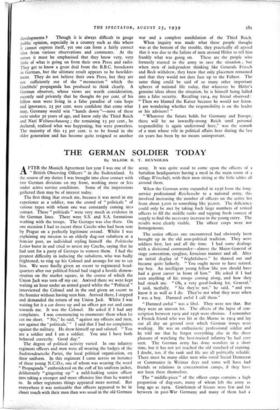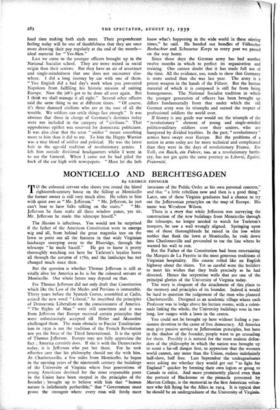THE GERMAN SOLDIER TODAY
By MAJOR B. T. REYNOLDS
AFTER the Munich Agreement last year I was one of the " British Observing Officers " in the Sudetenland. In the course of my duties I was brought into close contact with two German divisions on my front, working more or less under active service conditions. Some of the impressions gathered then may be of interest today.
The first thing that struck me, because it was novel in my experience as a soldier, was the crowd of " politicals " of various types with whom one was constantly coming into contact. These " politicals " were very much in evidence in the German lines. There were S.S. and S.A. formations working with the troops. The Gestapo was also there. On one occasion I had to escort three Czechs who had been sent by Prague on a perfectly legitimate errand. Whilst I was explaining my mission to an elderly dug-out subaltern at a fronier post, an individual styling himself the Politische Leiter burst in and tried to arrest my Czechs, saying that he had sent for a party of Gestapo to remove them. I had the greatest difficulty in inducing the subaltern, who was badly frightened, to ring up his Colonel and arrange for me to see him. We were finally given an escort to regimental head- quarters after our political friend had staged a hostile demon- stration on the market square, in the course of which the Union Jack was torn off my car. Arrived there we were kept waiting an hour under an armed guard whilst the "Political " interviewed the Colonel and in the end given an escort to the frontier without having seen him. Arrived there, I stopped and demanded the return of my Union Jack. Whilst I was waiting for it a car drove up and an officer got out and came towards me. It was the Colonel. He asked if I had any complaints. I was commencing to enumerate them when he cut me short. " No," he said, " against my officers and men, not against the politicals.' " I said that I had no complaints against the military. He drew himself up and saluted. " You are a soldier and I am a soldier. You and I have both behaved correctly. Good day."
The degree of political activity varied. In one infantry regiment officers and men were all wearing the badges of the Sudetendeutsche Partei, the local political organisation, on their uniform. In this regiment I came across an instance of three young N.C.O.s, one of whom was wearing the word " Propaganda " embroidered on the cuff of his uniform jacket, deliberately " gingering up " a mild-looking senior officer into taking a stronger and more offensive line than he wanted to. In other regiments things appeared more normal. But everywhere it was noticeable that officers appeared to be in closer touch with their men than was usual in the old German army. It was quite usual to come upon the officers of a battalion headquarters having a meal in the main room of a village Wirschaft, with their men sitting at the little tables all around them.
When the German army expanded in 1936 from the long- service professional Reichswehr to a national army, this involved increasing the number of officers on the active list from about 5,000 to something like 30,000. The deficiency could only be met by taking back large numbers of retired officers to fill the middle ranks and tapping fresh sources of supply to find the necessary increase in the young entry. The results were clearly visible. The officer corps were not homogeneous.
The senior officers one encountered had obviously been brought up in the old non-political tradition. They were soldiers first, last and all the time. I had some dealings with a divisional commander—almost the Major-General of stage convention, eyeglass, ferocious manner and all. After an initial display of " frightfulness " he thawed out and became quite fatherly. " You ought never to have retired, my boy. An intelligent young fellow like you should have bad a great career in front of him." He asked if I had seen anything of his troops coming along, and how they had struck me. " Oh, a very good-looking lot, General," I said, tactfully. " No they're not," he said, " and you know it as well as I do. They're not what they were when I was a boy. Damned awful I call them."
" Damned awful " was a libel. They were not that. But they were an uneven lot. The effects of the lapse of con- scription between 1919 and 1936 were obvious. I remember a French friend who was hit at the Marne in 1914 and lay out all day on ground over which German troops were working. He was an enthusiastic professional soldier and he told me that he forgot everything else in the sheer pleasure of watching the best-trained infantry 'he had ever seen. The German army has done wonders in a short time, but it has not yet reached the old standard of training. I doubt, too, if the rank and file are all politically reliable. There must be many older men who voted Social Democrat or Communist in Weimar days and some will have had friends or relations in concentration camps, if they have not been there themselves.
The " middle-piece " of the officer corps contains a high proportion of dug-outs, many of whom left the army as long ago as 1919. Gentlemen of leisure were few and far between in post-War Germany and many of them had a hard time making both ends meet. Their preponderant feeling today will be one of thankfulness that they are once more drawing their pay regularly at the end of the month— ideal material for " Yes-Men."
Last we come to the younger officers brought up in the National Socialist school. They are more mixed in social origin than their seniors. But they have an air of assurance and single-mindedness that one does not encounter else- where. I did a long journey by car with one of them. " You English did a bad day's work when you prevented Napoleon from fulfilling his historic mission of uniting Europe. Now the job's got to be done all over again. But I think we shall manage it all right." Several other officers said the same thing to me at different times. " Of course, it's these damned civilians who are at the root of all the trouble. We soldiers can settle things fast enough." It was obvious that those in charge of Germany's destinies today were not included in the category of " civilians." That opprobrious epithet was reserved for democratic politicians. It was also clear that the term " soldier " meant something more to him than it did to me. To him the Happy Warrior was a nice blend of soldier and political. He was the latest heir to the age-old tradition of revolutionary armies. I left him outside divisional headquarters whilst I went in to see the General. When I came out he had piled the back of the car high with newspapers. " Must let the lads know what's happening in the wide world in these stirring times," he said. He handed out bundles of Mkischer Reobachter and Schwartze Korps to every post we passed on the way home.
Since those days the German army has had another twelve months in which to perfect its organisation and training. One cannot doubt that it has made full use of the time. All the evidence, too, tends to show that Germany is more united than she was last year. The army is a potent weapon in the hands of the Flihrer. But the human material of which it is composed is still far from being homogeneous. The National Socialist tradition in which the younger generation of officers has been brought up differs fundamentally from that under which the old German army won its triumphs and earned the respect of professional soldiers the world over.
If history is any guide war would see the triumph of the " revolutionary " element of young and single-minded politico-military soldiers over their seniors, who are hampered by divided loyalties. In the past, " revolutionary " armies have swept over Europe. But the problems of a nation in arms today are far more technical and complicated than they were in the days of revolutionary France. Ein Volk, ein Reich, ein Fiihrer, too, as a revolutionary battle- cry, has not got quite the same potency as Liberte, Egalite, Fraternite.









































 Previous page
Previous page